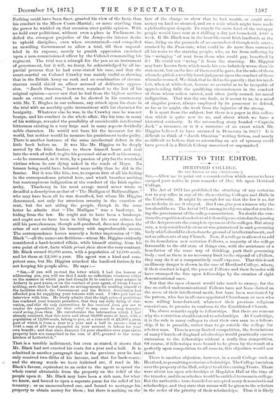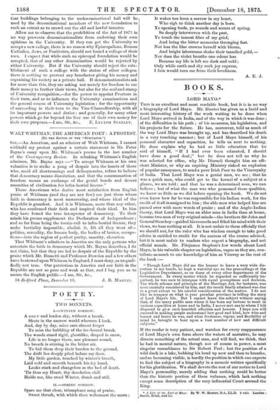LETTERS TO THE EDITOR.
[TO TUR EDITOR OF TOE " SPECTATOR:1
SIR,—Allow me to point out a consideration which seems to have escaped your notice in your remarks of Dec. 4th upon Hertford College.
The Act of 1871 has prohibited the attaching of any sectarian test to any office in any of the then existing Colleges and Halls in the University. It might be enough for me that the law is so, for me to desire to see it obeyed. But I can give you a reason why the law should bc so. The Act of 1871 among its objects aimed at render- ing the government of the colleges unsectarian. No doubt the con- tinued recognition of such clerical fellowships as existed at the passing of the Act prevents the complete openness of the colleges. But atany rate, a veryconsiderable element was guaranteed in each governing body which should be elected on the ground of intellectual merit, and not as adherents of any Church. Now, if a college is allowed to add to its foundation new sectarian Fellows, a majority of the college favourable to the old state of things can, with the assistance of a benefactor of the same way of thinking, pack their governing body ; and as there is no necessary limit to the stipend of a Fellow, they may do it at a comparatively small expense. That this is not an illusory danger is shown in the case of Hertford College, where, if their conduct is legal, the present Fellows and their founder will have swamped the five open fellowships by the creation of eight denominational ones.
Not that the open element would take much to swamp, for the five so-called undenominational Fellows have not been elected on the score of their intellectual merit, but have been nominated by the patron, who has in all cases appointed Churchmen or men who were willing henceforward, whatever their previous religious convictions, to promise to conform to the Established Church.
The above remarks apply to fellowships. But there are reasons why the restriction should extend to scholarships. At Cambridge, it is the rule in many colleges to elect their own man to a fellow- ship, if he is passable, rather than to go outside the college for a better man. Thus in a very limited competition, the foundations of many Church-of-England scholarships would practically ensure succession to the fellowships without a really free competition. Of course, if fellowships were bound to be given by the result of a perfectly open competition to all comers, this objection would not stand.
There is another objection, however, in a small College such as Hertford, to pertnitting sectarian scholarships. The College has taken over the property of the Hall, subject to all the existing Trusts. There were about ten open scholarships at Magdalen Hall at the time of the transfer, and these scholars would be entitled to rooms in college. But the authorities have founded or accepted many denominational scholarships, and they state that rooms will be given to the scholars in the order of the priority of their scholarships. Thus it is likely that buildings belonging to the undenominational hall will be used by the denominational members of the new foundation to such an extent as to crowd out the old and lawful inmates.
Allow me to observe that the prohibition of the Act of 1871 in no way prevents denominationalists from endowing their own opinions in the University. If they can get the University to accept a new college, there is no reason why Episcopalians, Roman Catholics, Jews, or Positivists, should not found a college of their own. I expect that while such an episcopal foundation would be accepted, that of any other denomination would be rejected by either University. But if the University should reject the esta- blishment of such a college with the status of other colleges, there is nothing to prevent any benefactor giving his money and organising his society as a private hall. If denominationalists ask for more than this, they are asking not merely for freedom to use their money to further their views, but also for the seal and stamp of University recognition,—for the power to appoint Proctors in their turn, and so to influence the University examinations and the general course of University legislation ; for the opportunity of succeeding in their turn to the Vice-Chancellorship, with all its important powers and duties ; and generally, for many other powers which go far beyond the free use of their own money for their own purposes.—I am, Sir, &c., E. LI-IMPEL STANLEY.







































 Previous page
Previous page